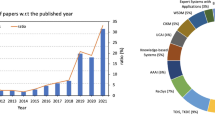Abstract
Recommender systems use nowadays more and more data about users and items as part of the recommendation process. The availability of auxiliary data, going beyond the mere user/item data, has the potential to improve recommendations. In this work we examine the contribution of two types of social auxiliary data – namely, tags and friendship links – to the accuracy of a graph-based recommender. We measure the impact of the availability of auxiliary data on the recommendations using features extracted from both the auxiliary and the original data. The evaluation shows that the social auxiliary data improves the accuracy of the recommendations, and that the greatest improvement is achieved when graph features mirroring the nature of the auxiliary data are extracted by the recommender.
Access this chapter
Tax calculation will be finalised at checkout
Purchases are for personal use only
Preview
Unable to display preview. Download preview PDF.
Similar content being viewed by others
References
Abel, F., Herder, E., Houben, G.-J., Henze, N., Krause, D.: Cross-system user modeling and personalization on the social web. User Model. User-Adapt. Interact. 23(2-3), 169–209 (2013)
Berkovsky, S., Kuflik, T., Ricci, F.: Cross-technique mediation of user models. In: Wade, V.P., Ashman, H., Smyth, B. (eds.) AH 2006. LNCS, vol. 4018, pp. 21–30. Springer, Heidelberg (2006)
Cantador, I., Brusilovsky, P., Kuflik, T.: Second workshop on information heterogeneity and fusion in recommender systems. In: RecSys (2011)
Cantador, I., Konstas, I., Jose, J.M.: Categorising social tags to improve folksonomy-based recommendations. J. Web Sem. 9(1), 1–15 (2011)
Chen, T., Kaafar, M.A., Friedman, A., Boreli, R.: Is more always merrier?: A deep dive into online social footprints. In: WOSN, pp. 67–72. ACM (2012)
Cremonesi, P., Koren, Y., Turrin, R.: Performance of recommender algorithms on top-n recommendation tasks. In: RecSys, pp. 39–46 (2010)
Freyne, J., Berkovsky, S., Daly, E.M., Geyer, W.: Social networking feeds: recommending items of interest. In: RecSys, pp. 277–280 (2010)
Friedman, J.H.: Greedy function approximation: A gradient boosting machine. Annals of Statistics 29, 1189–1232 (2000)
Groh, G., Birnkammerer, S., Köllhofer, V.: Social recommender systems. In: Recommender Systems for the Social Web, pp. 3–42. Springer (2012)
Guy, I., Zwerdling, N., Ronen, I., Carmel, D., Uziel, E.: Social media recommendation based on people and tags. In: SIGIR, pp. 194–201 (2010)
Haupt, J.: Last.fm: People-powered online radio. Music Reference Services Quarterly 12(1-2), 23–24 (2009)
Konstas, I., Stathopoulos, V., Jose, J.M.: On social networks and collaborative recommendation. In: SIGIR, pp. 195–202 (2009)
G. Shani and A. Gunawardana. Evaluating recommendation systems. In Recommender Systems Handbook, pages 257–297. 2011.
Shapira, B., Rokach, L., Freilikhman, S.: Facebook single and cross domain data for recommendation systems. User Modeling and User-Adapted Interaction 23(2-3), 211–247 (2013)
Tiroshi, A., Berkovsky, S., Kaafar, M.A., Chen, T., Kuflik, T.: Cross social networks interests predictions based ongraph features. In: RecSys, pp. 319–322. ACM (2013)
Tiroshi, A., Berkovsky, S., Kaafar, M.A., Vallet, D., Chen, T., Kuflik, T.: Improving business rating predictions using graph based features. In: IUI, pp. 319–326. ACM (2014)
Author information
Authors and Affiliations
Editor information
Editors and Affiliations
Rights and permissions
Copyright information
© 2014 Springer International Publishing Switzerland
About this paper
Cite this paper
Tiroshi, A., Berkovsky, S., Kaafar, M.A., Vallet, D., Kuflik, T. (2014). Graph-Based Recommendations: Make the Most Out of Social Data. In: Dimitrova, V., Kuflik, T., Chin, D., Ricci, F., Dolog, P., Houben, GJ. (eds) User Modeling, Adaptation, and Personalization. UMAP 2014. Lecture Notes in Computer Science, vol 8538. Springer, Cham. https://doi.org/10.1007/978-3-319-08786-3_40
Download citation
DOI: https://doi.org/10.1007/978-3-319-08786-3_40
Publisher Name: Springer, Cham
Print ISBN: 978-3-319-08785-6
Online ISBN: 978-3-319-08786-3
eBook Packages: Computer ScienceComputer Science (R0)




